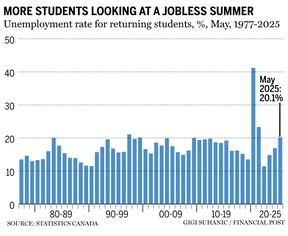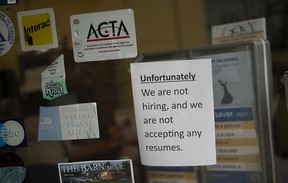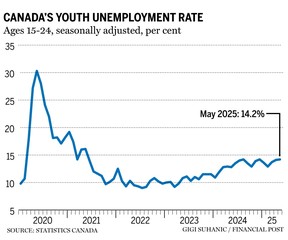
Article content
This spring, Kate Miles wrapped up exams and embarked on a rite of passage familiar to many university students: applying for summer jobs.
THIS CONTENT IS RESERVED FOR SUBSCRIBERS ONLY
Subscribe now to read the latest news in your city and across Canada.
- Exclusive articles from Barbara Shecter, Joe O'Connor, Gabriel Friedman, and others.
- Daily content from Financial Times, the world's leading global business publication.
- Unlimited online access to read articles from Financial Post, National Post and 15 news sites across Canada with one account.
- National Post ePaper, an electronic replica of the print edition to view on any device, share and comment on.
- Daily puzzles, including the New York Times Crossword.
SUBSCRIBE TO UNLOCK MORE ARTICLES
Subscribe now to read the latest news in your city and across Canada.
- Exclusive articles from Barbara Shecter, Joe O'Connor, Gabriel Friedman and others.
- Daily content from Financial Times, the world's leading global business publication.
- Unlimited online access to read articles from Financial Post, National Post and 15 news sites across Canada with one account.
- National Post ePaper, an electronic replica of the print edition to view on any device, share and comment on.
- Daily puzzles, including the New York Times Crossword.
REGISTER / SIGN IN TO UNLOCK MORE ARTICLES
Create an account or sign in to continue with your reading experience.
- Access articles from across Canada with one account.
- Share your thoughts and join the conversation in the comments.
- Enjoy additional articles per month.
- Get email updates from your favourite authors.
THIS ARTICLE IS FREE TO READ REGISTER TO UNLOCK.
Create an account or sign in to continue with your reading experience.
- Access articles from across Canada with one account
- Share your thoughts and join the conversation in the comments
- Enjoy additional articles per month
- Get email updates from your favourite authors
Sign In or Create an Account
or
Article content
Hoping to land part-time work at a restaurant, the 19-year-old first-year psychology student completed the Smart Serve certification to work in licenced establishments. She applied online and in person for about 20 jobs in the Toronto area but didn’t get any responses.
Article content
Article content
Article content
“My sister is eight years older than me and when she was in university, she would come home for the summers and work at Lone Star,” she said. “I never saw her going through a challenge to find a summer job, and neither did any of my older cousins. It came as a bit of a shock to me.”
Article content
By signing up you consent to receive the above newsletter from Postmedia Network Inc.
Article content
Miles currently works as a tennis instructor, a job she’s had for the past four summers. She enjoys it and the hourly pay is above minimum wage, but she’s only working a few hours a week until registration picks up in July and August.
Article content
“It’s been pretty discouraging,” she said of her job search. “It’s just so much effort and I’m not hearing back from any of them.”
Article content
Miles is one of the thousands of young Canadians in their teens and early 20s trying to enter the seasonal job market to earn money, build skills, make connections and get a taste of life in the working world.
Article content
But the days of covering the cost of tuition and living expenses with summer wages are long gone, and the rise of precarious gig work and more competition are causing a generational shift in the employment landscape where many students can’t find a job at all.
Article content
Article content

Article content
In 2024, the Canadian National Exhibition made headlines when 37,000 people registered for its job fair — more than double the previous year and more than seven times the 5,000 jobs available for the 18-day annual event.
Article content
Article content
Over the past few years, viral videos showing massive lineups for job fairs at malls, retail stores, restaurants, grocery stores and fast food joints have abounded online.
Article content
It’s been pretty discouraging. It’s just so much effort and I'm not hearing back from any of them
Kate Miles, student searching a for summer job
Article content
Canada’s youth unemployment rate for those aged 15-24 was 14.2 per cent in May, according to Statistics Canada — double the national unemployment rate of seven per cent. For returning students (those who attended school full-time in March and intend to return to school full-time in the fall), the jobless rate reached 20.1 per cent, a level not seen since May 2009.
Article content

Article content
It’s shaping up to be a “cool summer,” according to a seasonal jobs report by Indeed Hiring Lab released last month. The report showed summer job postings were down 22 per cent in Canada compared to a year ago. Postings for summer camp roles, “typically the largest single category of summer job ads,” were down 32 per cent. Posts seeking painters, lifeguards, labourers, maintenance and customer service representatives also declined.
Advertisement 1
Advertisement 2
Article content
The seasonal job market is unique, but it’s also interconnected with what’s happening in the broader job market and economy, said Brendon Bernard, senior economist at Indeed Hiring Lab. After a post-pandemic hiring surge that peaked in 2022 and was solid in 2023, the overall job market and summer hiring appetite cooled off in 2024 as employers face headwinds such as inflation and rising interest rates.
Article content
Article content
Employees job-hop to advance their careers and land better, higher-paying work when the job market is strong, but they tend to stay in their existing roles when things slow down, creating a “traffic jam” that leaves youth and people with less experience on the sidelines with fewer opportunities.
Article content
“What has stood out, though, is that while youth unemployment and unemployment of people over 25 have both trended up over the past two, two-and-a-half years, the youth unemployment rate has spiked more,” Bernard said. “The deterioration has been faster and greater than we’d expect.”
Article content
He said young people have also been hit with a “double whammy” of a weaker labour market and a surge in job seekers due to rapid population growth, especially concentrated among people under 25.
Article content
Article content
“It’s a bit of bad timing for these two trends to coincide, and that’s a factor behind the weak youth numbers,” he said.
Article content

Article content
For example, an influx of young people in Toronto are seeking help from the non-profit agency Youth Employment Services (YES). It’s not the first time chief executive Timothy Lang has seen a tough summer job market, but it does mean that young people need to put more resumés out there, hone their interview skills and travel farther for work.
Article content
“Gone are the days where you might have a stack of resumés and walk down a street and go into some places,” he said. “Now everyone’s saying: ‘No, no, just send it to us online.’ And it’s easier for the employers to just scan through, but they’re getting thousands and thousands of resumés and then it’s harder to put a face to a name.”
Article content
Lang said there are summer jobs out there, but the short-term effects of population growth mean more people are applying for the same number of jobs, especially in larger cities.
Article content
“It definitely makes it tougher and discouraging for youth who in the past have always had to pound the pavement to some extent, but now they have to do two or three times the work to land the same job,” he said.
Article content
Article content
‘Crisis level’
Article content
Youth employment has always been sensitive to the whims of the wider economy. Canada’s youth unemployment rate averaged 16.2 per cent from 1990 to 1997, which included a severe recession between 1990 and 1992. Amid the great recession of 2008-09, the rate peaked at 16.4 per cent in July 2009. During the COVID-19 pandemic, youth unemployment increased to a peak of 28.8 per cent in May 2020 from 17.1 per cent in March 2020.
Article content
Along with the COVID-19 pandemic amplifying many of the challenges young people face, economic challenges layered on top of technological changes has caused youth employment to reach a “crisis level,” said Ilona Dougherty, co-creator and managing director of the Youth & Innovation Project at the University of Waterloo in Ontario.
Article content
Gone are the days where you might have a stack of resumés and walk down a street and go into some places
Timothy Lang, CEO of Youth Employment Services
Article content
“The summer job is certainly becoming a less consistent rite of passage,” she said. “And as a result, you see young people in their mid- or late 20s with master’s degrees who have literally never had a job, and then they’re struggling to get into the workforce.”
Article content
Dougherty said alarm bells started going off for her a year ago, when she hosted a webinar on how to find a job. She was surprised when around 600 people registered. During follow-up calls with about a dozen participants, she heard the “incredible frustration” felt by many of them after sending out 100 resumés and not getting a single response.
Article content
“Gen X, millennials and onward are living in a context where employers don’t have a lot of loyalty towards employees. The likelihood that you’re going to have a job for 40 years is very, very low,” she said. “We’re in a moment of economic challenge, but then layered onto this is the technological shift with AI, which is essentially breaking the career ladder.”
Article content
Dougherty is referencing a recent New York Times article by LinkedIn Corp.‘s chief economic opportunity officer, Aneesh Raman, who wrote that artificial intelligence “poses a real threat to a substantial number of the jobs that normally serve as the first step for each new generation of young workers.”
Article content
AI isn’t swallowing jobs right away, Raman explained, but the change is coming and “virtually all jobs will experience some impacts,” he wrote. If entry-level jobs disappear, Raman predicts it will exacerbate job market inequality for “those lacking elite networks or privileged backgrounds” and leave employers without enough people to take up leadership roles in the future.
Article content
“Any change to young workers’ job fortunes hits them at a particularly vulnerable time; getting a late start can slow down workers’ careers for decades,” he wrote.
Article content
Article content
Meanwhile, some parents of high school students want them to do volunteer work or activities that will look good on a university application. But the outcome is the same: a delayed passage into adulthood.
Article content
“We see it all around us. Young people not having kids, choosing not to have kids, not being able to afford a home because you need a stable job to get a mortgage, but you also need a stable job to save for a home,” said Dougherty.
Article content
Mind the skills gap
Article content
Perhaps nowhere is more attuned to the youth unemployment problem than Windsor, Ont. The city has been referred to as “Canada’s youth unemployment capital,” which bodes with its history of having one of the country’s highest jobless rates, Mikal Fakhreddin, project coordinator and research analyst at the nonprofit Workforce WindsorEssex, said.
Article content
“People who can’t find jobs in their own industries, if they have an educational background for it, tend to gravitate towards entry-level jobs because they can’t get the jobs they want, and then they take those jobs from students or youth who primarily start their work experiences in entry-level jobs,” she said.
Article content
Article content
Fakhreddin said youth unemployment is usually much lower in the summer months as jobs open in retail, tourism, hospitality, sports and recreation, as well as through the federal government’s Canada Summer Jobs program, which provides wage subsidies to help employers create summer job opportunities for youth aged 15 to 30 years.
Article content

Article content
In an acknowledgement of the tough youth job market, the federal government just announced that it will reallocate $25 million toward an additional 6,000 spots in the Summer Jobs program, bringing the total to 76,000 jobs across the country.
Article content
But at the end of August, unemployment spikes again. To help tackle Windsor’s chronic problems, Fakhreddin published the Youth Employment Strategy Plan earlier this year. The report analyzes local employment data and the level of support available to youth and identifies targeted priorities and feasible solutions that Workforce WindsorEssex hopes to implement over the next five years.
Article content
For this fiscal year, Fakhreddin said the agency has committed to working on a device donation program to help address a “lack of connectivity” among marginalized youth who don’t have phones or laptops to search for jobs.
Article content
The agency is also working on a youth-friendly advertising guidebook to help spread awareness about existing employment resources with other organizations and is developing a dedicated youth portal on its website through which young people can apply for jobs. The portal will go live in a few months.
Article content
Workforce WindsorEssex also hopes to expand its high school presentation program, which educates students about in-demand job opportunities, industries on the rise and labour market information specific to the region.
Article content
Fakhreddin said some of the main barriers to employment for young people include not knowing where to look for career information or where to apply, developing and articulating their skillset and writing a strong resumé. But one of the biggest challenges is landing that first job with no previous experience.
Article content
“That’s been an issue for them because almost everyone looks for experience these days, but no one’s willing to give them that first chance,” she said.
Article content
It’s a classic dilemma Edie Hodgson experienced firsthand this spring. After finishing her first year of university in Halifax and returning home to Toronto, the 18-year-old estimates she applied for 40 to 60 jobs, handing out resumés in person and applying online.
Article content
Article content
“I applied somewhere, and they’d be like, ‘Sorry, you need five years of experience.’ How do I even get that experience? I couldn’t be a barista because everywhere I go you need barista experience,” she said.
Article content

Article content
Article content
After an initially unsuccessful search, Hodgson ended up at a fast-food restaurant where she worked in high school. By chance, a vacancy opened up to run the arts and crafts program in July and August at an overnight summer camp where Hodgson previously worked as a camp counsellor.
Article content
The leadership role is a good fit for Hodgson, a fine art student, and gives her the opportunity to have a positive impact on kids and spark their interest in art.
Article content
“Even if they don’t become artists, I think art is really beneficial for everyone,” she said. “I remember when I was a kid and I was going to summer camp, the older staff there really influenced me and had a big impact on me.”
Article content
Her twin brother, Oscar, is also returning to his job at a family-owned piano store. A music student and pianist, he started working there in high school after introducing himself to the owner, who was outside washing the shop windows.
Article content
Article content
“Coming up with communication systems is a big one,” he said of the skills he’s learned on the job. “And then just staying organized and staying on top of … what do we need to do? What work is going on in the shop? How can we help? How can we keep things moving?” he said.
Article content
Working at the store has also helped Oscar get referrals to teach piano lessons around the city, and his job has evolved into tasks beyond administration work and covering the phone.
Article content
“We’re doing a summer concert series, so I’ve been put in charge of that. Because I’m a music student, I’m going to record a bunch of the pianos for the website, and so things like that are a little bit more engaging,” he said.
Article content
Having young people around is good for employers, too. Dougherty said younger people are wired to be bold problem solvers, a quality that comes in handy during times of uncertainty and change. Younger workers also benefit from learning about strategy planning, emotional intelligence and contextual knowledge from experienced workers. For businesses to thrive, workplaces need intergenerational teams to work together.
Article content
“If we want a strong economy and we want our companies and government to have the kind of workers it’s going to need in five to 10 years, you need those entry-level roles,” said Dougherty. “You need young people to be meaningfully engaged in the economy; otherwise we’re going to be in big trouble.”
Article content
Article content
Bookmark our website and support our journalism: Don’t miss the business news you need to know — add financialpost.com to your bookmarks and sign up for our newsletters here.
Article content
.png)




